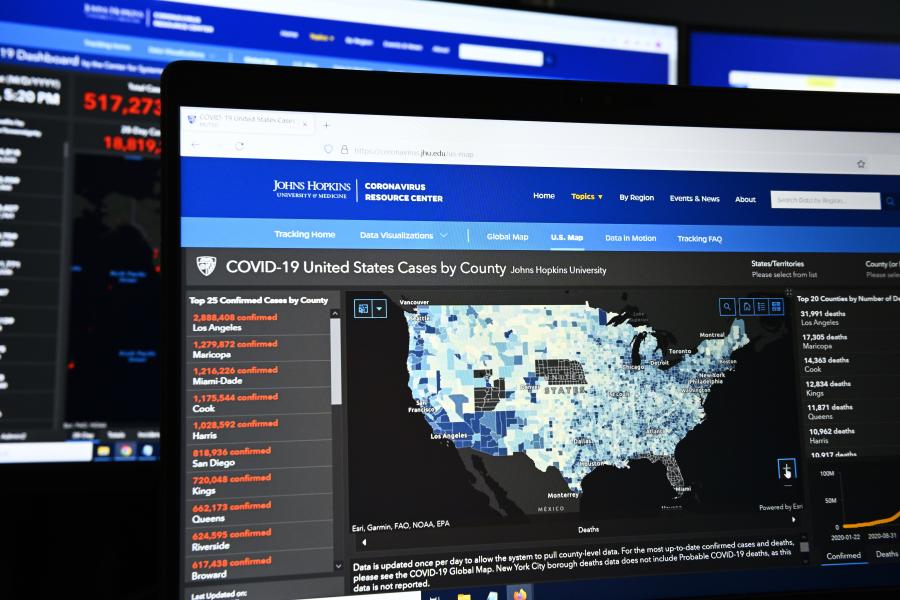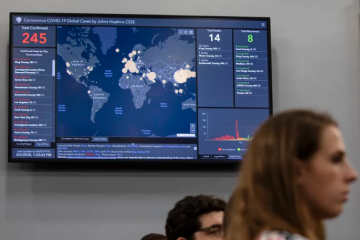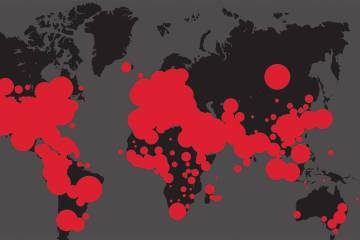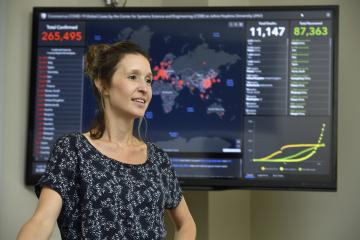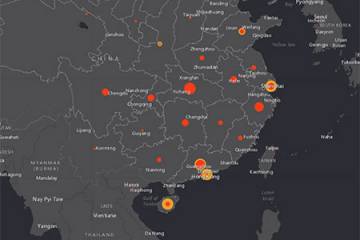Johns Hopkins University & Medicine plans to cease the Coronavirus Resource Center's ongoing collection and reporting of COVID-19 data on March 10—three years after the institution embarked on the unprecedented effort of tracking an unfolding pandemic in near real time.
The pioneering public service has operated since the novel coronavirus first began spreading globally in January 2020 to provide the public, journalists, and policymakers across the United States and around the world with visualizations of cases and deaths as they were being reported.
Johns Hopkins' comprehensive pandemic data will remain free and accessible to researchers, journalists, and the public for all data reported between Jan. 22, 2020, and March 10, 2023. In addition, the interdisciplinary group of faculty and experts in data science, epidemiology, medicine, public health policy, and vaccinology that advised and led the Coronavirus Resource Center (CRC) will continue to provide analysis and guidance regarding the ongoing pandemic.
The CRC initiative drew on the expertise and collaboration of researchers and faculty from across Johns Hopkins, including the Bloomberg School of Public Health, Whiting School of Engineering, Applied Physics Laboratory, School of Medicine, Sheridan Libraries, and the Bloomberg Center for Government Excellence.
"Every division of Johns Hopkins contributed to making the Coronavirus Resource Center into an invaluable, trusted source of information and guidance relied on by the public and policymakers," Johns Hopkins University President Ron Daniels said. "This interdisciplinary rapid response to the world's worst pandemic in a century exemplifies the critical role research universities have to play in global crises. Johns Hopkins remains committed to providing the public with the most up-to-date research and analysis of the pandemic and will use these same tools to keep building a safer, healthier, more stable global community."
The CRC site was launched to meet an urgent need when governments lacked the capacity to mount comprehensive, real-time public health surveillance and reporting on the spread of SARS-CoV-2. The CRC's U.S. and global data dashboards served as a model for states, counties, and other nations to replicate as they were able to stand up public reporting of public health data.
"After three years of round-the-clock work building and maintaining a 24/7 global resource, we have reached the appropriate time to close this chapter of our response and look to other ways to keep the public safe and informed," said Lauren Gardner, director of the Johns Hopkins Center for Systems Science and Engineering. "But if we're needed again, we stand ready and willing to serve."
When Gardner and her graduate student, Ensheng Dong, launched "the Hopkins map," as it was popularly known, the Applied Physics Laboratory quickly stepped in to expand and scale the dashboard to meet intense global demand. The university then invested in the establishment of the full Coronavirus Resource Center, which launched on March 3, 2020, and added a U.S. county-level dashboard developed by the Bloomberg Center for Government Excellence. As the pandemic and public health responses evolved, the CRC expanded its data aggregation and reporting capabilities to include data on testing, hospitalizations, contact tracing, vaccines, and public policy interventions.
Since the Coronavirus Resource Center's launch, the website has been viewed more than 2.5 billion times, and users around the world have generated more than 200 billion data requests.
The CRC was designed to provide aggregated, real-time global data reported at the federal, state, county, and tribal nation levels. Starting in 2021, however, U.S. states and counties began to consistently reduce the amount of publicly reported data—a shift that led the CRC in September 2022 to discontinue hourly reporting for testing and vaccine data. Since then, public reporting by states has continued to decline. As of January, only New York, Arkansas, and Puerto Rico publish daily data for cases and deaths. To highlight those concerns, in 2021 Beth Blauer, associate vice provost for public sector innovation and CRC data lead, and Lainie Rutkow, CRC project lead and vice provost for interdisciplinary initiatives, launched the CRC's Pandemic Data Initiative, a yearlong project that featured insights into public data practices from experts from every part of Johns Hopkins.
Meanwhile, the federal government has significantly expanded its data tracking and reporting capacities. CRC leaders are confident that the public and policymakers will have ongoing access to trustworthy COVID-19 data and guidance from U.S. agencies.
"When this project began in January 2020, the Applied Physics Lab was able to quickly leverage our decades of disease surveillance knowledge and data analysis experience and establish a critical tool for leaders and the public," said APL's Sheri Lewis, deputy National Health Mission Area executive. "Even more importantly, we've also been able to transition what we learned back to the government to help them prepare for what comes next."
The Coronavirus Resource Center was listed among Time magazine's Top 100 Inventions for 2020, and the team has also earned numerous academic accolades and awards from leading organizations including Research!America, Fast Company, and the World Federation of Public Health Associations. Gardner was awarded the Lasker-Bloomberg Public Service Award in 2022 for her innovative work with Dong to launch the global dashboard.
All of the institutions' other efforts related to research and analysis of COVID-19 are continuing—including the myriad COVID-19 resources provided by the Center for Health Security and the multiple projects at the International Vaccine Access Center, or IVAC, which include one of the most comprehensive collections of research into the use and impact of COVID-19 vaccines. The CRC's COVID-19 experts will continue to participate in 30-minute livestreamed briefings when conditions warrant that they share their insights with the public and the media. Additionally, Hopkins experts will continue to advocate for better public data.
"The widespread use of at-home rapid tests has significantly diminished the utility and accuracy of case data," Blauer said. "The hospitalization data collected and reported by the U.S. Department of Health and Human Services is now the most reliable and complete data remaining for use in public health decisions and policymaking. This is valuable, but insufficient to fully track and understand the pandemic; we are concerned about the persistent, across-the-board declines in the quality and availability of COVID-19 data."
In addition to Gardner, Blauer, and Rutkow, the Hopkins faculty who led and advised the CRC include:
- William Moss, CRC vaccinology lead and executive director of the Bloomberg School of Public Health's International Vaccine Access Center
- Brian Garibaldi, CRC clinical lead and director of the Johns Hopkins Biocontainment Center
- Crystal Watson, CRC public health lead and senior scholar at the Center for Health Security
- Jennifer Nuzzo, formerly of the Center for Health Security
The final update of the CRC's data will take place on March 10, 2023. After that date, all of the resource center's raw data will remain publicly accessible through the site's Github repositories. This will allow researchers, modelers, analysts, and journalists to continue to leverage the CRC's full set of data from Jan. 22, 2020, to March 10, 2023.
The CRC's launch, expansion, and continuous operation were made possible through generous support from Bloomberg Philanthropies, the Stavros Niarchos Foundation, the National Science Foundation, and university sources—totaling approximately $13 million in funds over three years.
Posted in Health, University News
Tagged covid-19, coronavirus resource center




